"The trouble with you, M., is that you think everybody is exactly like you. What you can't stand, they can't stand. What's hell for you has to be hell for them. How do you know what they feel about their lives? If it was as bad as you think, they'd kill themselves instead of having more kids and setting off fireworks."
Friday, May 27, 2011
Ernest Hemingway to Martha Gellhorn, after she had gotten hysterical from observing child labor and a bunch of other horrifying things in Hongkong in early 1941 (from Mr Ma's Tigers/Travels With Myself and Another):
Tuesday, May 24, 2011
A Filipino cleaning lady, who has two kids back home and is pregnant with her third one right now, works at least half a dozen jobs here in Moscow to support her family so far away. Her husband joined her half a year ago and works alongside her: a four-hour job now takes two hours to complete. She misses her kids terribly, talks to them on Skype. She has seen her 4-year-old younger daughter only once in the past three years, for a month. In the fall, she'll travel to the Philippines to give birth, but her husband will stay behind and continue working. When the new baby turns six months old, she'll return to Moscow.
From my Dear Diary, Nov. 28, 2008:
6 AM, rainy and cold, disgusting outside. From the balcony, I'm observing a guy who, with the help of a flashlight, is searching through the garbage containers and is also going through all the crap strewn around on the ground down below. As he's leaving, he tiptoes very carefully to the side, to avoid stepping into a puddle right in front of him - as if he's got something to lose if he gets his feet wet...
Sunday, May 22, 2011
So interesting to read about the Meiji period (1868-1912) in Japan in Ian Buruma's book - and when I reached the passage quoted below, I was, quite unexpectedly, reminded of the Turkish history:
I was even more surprised to run into a mention of Pierre Loti in the subsequent paragraph: the French novelist's Istanbul "headquarters" on top of the hill in Eyüp offers a great view of the Golden Horn/Haliç and is a lovely place to visit. Turns out Pierre Loti had recorded some of his observations - "supercilious and probably quite accurate" - of the Japanese "Europeanization" attempts in 1885, well before Turkey took a similar path:
And then this - which brings to mind the more recent Turkish history:
And, finally, this:
Writing almost a century later, the novelist Mishima Yukio could still work himself into a rage about the superficial primness of the Meiji years. Prohibitions on public nudity, mixed bathing, and other embarrassing signs of "the coarse and the mean" stemmed less from native prudery than from fear of foreign disapproval.
I was even more surprised to run into a mention of Pierre Loti in the subsequent paragraph: the French novelist's Istanbul "headquarters" on top of the hill in Eyüp offers a great view of the Golden Horn/Haliç and is a lovely place to visit. Turns out Pierre Loti had recorded some of his observations - "supercilious and probably quite accurate" - of the Japanese "Europeanization" attempts in 1885, well before Turkey took a similar path:
The exterior of the [Deer Cry Pavilion], designed by a British architect in a mixture of high Victorian, French Empire and Italian Renaissance styles, was likened by Loti to a provincial French spa. He thought the Japanese gentlemen, dressed up in suits of tails, looked like performing monkeys, and the ladies, lining the walls like tapestries in their hoops and flounces and satin trains, were, well, "remarkable." Doing their best to strike the proper European attitudes, gentlemen puffed Havana cigars and played whist, while others picked at the truffles and pâté and ice-cream sorbets laid out on the buffet tables. A French orchestra struck up operetta tunes, while a German band played polkas, mazurkas, and waltzes. Loti: "They danced quite properly, my Japanese in Parisian gowns. But one sense that it is something drilled into them that they perform like automatons, without any personal initiative. If by change they lose the beat, they have to be stopped and started all over again."
And then this - which brings to mind the more recent Turkish history:
It is easy to laugh at all this with Pierre Loti. But the intention behind the entertainment was serious. Inoue Kaoru was foreign minister in his friend Ito Hirobumi's cabinet. They hoped that rapid Westernization would make foreign powers treat Japan as an equal and thus agree to relinquish their privileges under the unequal treaties. [...] To critics of this kind of thing, Ito's government became known as "the dancing cabinet."
And, finally, this:
When it became clear that Western diplomats and writers were quite willing to dance, but not to revise the treaties as a result of Inoue's hospitality, the foreign minister's star began to fade. His policy was discredited, and in 1889 the Deer Cry Pavilion was sold to a private club. A backlash against all the Westernizing had already begun by then. The building, alas, is no more.
Thursday, May 19, 2011
On the way back home tonight, Marta and I ended up taking a cab, after having spent at least 20 minutes at a shitty bus stop, waiting for a trolleybus that never came.
The car was some sort of a Lada, I guess. The driver appeared to be either a Caucasus or a Central Asia native, rather young. I offered him 200 rubles, he asked softly to please make it 300, and Marta and I were too tired for me to engage in bargaining. The car's windows were tinted to such an extent that I almost fell asleep as soon as I got in, but Marta kept talking, so that saved me from embarrassing myself (what if I snored, right?).
At one point, she praised the car loudly, calling it "stylish," and I noticed that the driver began to smile. She also did quite a lot of reading of the largest logos along the way: Hitachi was one, and I explained that it was a Japanese company, and we discussed hiragana and kanji a little, and then she saw Rosgosstrakh written in really huge letters, unpronounceable and incomprehensible nevertheless, and she couldn't read it herself, of course, and I did my best to explain the basics of insurance business to her, using Iowa and tornadoes as the example, for some reason, and Marta asked if it was possible for a tree to insure itself against a storm. Since everything Marta and I talked about was funny in a cute way, I don't remember at which point the driver turned around, laughing, and asked how old Marta was.
When we got to our neighborhood, it turned out I only had a 500-ruble bill, and the driver, of course, didn't have any change, so he stopped by the kiosk and went to buy himself something and thus obtain 200 rubles for me. We sat in the car, waiting for him, listening to the 10PM newscast, with Marta commenting sadly on the sad news of a collapsed building somewhere in Vladimir. Then the driver came back, handed me the change - and presented Marta with a small pack of apple juice with a straw! We were totally delighted. I asked him where he was from - Tajikistan - and I said "rakhmat," thanking him, and Marta repeated after me, because she is by now used to thanking cab drivers in their native languages.
I do love Moscow sometimes.
The car was some sort of a Lada, I guess. The driver appeared to be either a Caucasus or a Central Asia native, rather young. I offered him 200 rubles, he asked softly to please make it 300, and Marta and I were too tired for me to engage in bargaining. The car's windows were tinted to such an extent that I almost fell asleep as soon as I got in, but Marta kept talking, so that saved me from embarrassing myself (what if I snored, right?).
At one point, she praised the car loudly, calling it "stylish," and I noticed that the driver began to smile. She also did quite a lot of reading of the largest logos along the way: Hitachi was one, and I explained that it was a Japanese company, and we discussed hiragana and kanji a little, and then she saw Rosgosstrakh written in really huge letters, unpronounceable and incomprehensible nevertheless, and she couldn't read it herself, of course, and I did my best to explain the basics of insurance business to her, using Iowa and tornadoes as the example, for some reason, and Marta asked if it was possible for a tree to insure itself against a storm. Since everything Marta and I talked about was funny in a cute way, I don't remember at which point the driver turned around, laughing, and asked how old Marta was.
When we got to our neighborhood, it turned out I only had a 500-ruble bill, and the driver, of course, didn't have any change, so he stopped by the kiosk and went to buy himself something and thus obtain 200 rubles for me. We sat in the car, waiting for him, listening to the 10PM newscast, with Marta commenting sadly on the sad news of a collapsed building somewhere in Vladimir. Then the driver came back, handed me the change - and presented Marta with a small pack of apple juice with a straw! We were totally delighted. I asked him where he was from - Tajikistan - and I said "rakhmat," thanking him, and Marta repeated after me, because she is by now used to thanking cab drivers in their native languages.
I do love Moscow sometimes.
Monday, May 16, 2011
Ten years since my last day in the States and NYC today/yesterday - May 15, 2001... I always remember pointless dates like this one (and in between these dates, I usually need a calendar to know what day it is)...
Anyway, it got me feeling nostalgic, so I took out my Dear Diary 2001 - and, among other things, found this clipping from the Financial Times (that I most likely picked on the connecting Paris-Moscow flight on May 16), about the late Victor Stepanovich Chernomyrdin and another dimension of "the language issue" (a somewhat distorted/exaggerated take on it):
Anyway, it got me feeling nostalgic, so I took out my Dear Diary 2001 - and, among other things, found this clipping from the Financial Times (that I most likely picked on the connecting Paris-Moscow flight on May 16), about the late Victor Stepanovich Chernomyrdin and another dimension of "the language issue" (a somewhat distorted/exaggerated take on it):
Excuse me?
FT, May 16, 2001
Victor Chernomyrdin's appointment as Russia's new ambassador to Ukraine may have taken many people by surprise, but he will have at least one advantage in his new job.
Onserver learns that he and Leonid Kuchma, the president of Ukraine, speak a slang-ridden version of Russian that is almost incomprehensible even for close associates to understand.
Given all the secretly recorded conversations that seem to have leaked from Kuchma's office in recent months, including a tape-recording of alleged instructions to kill a journalist, any future discussions between Kuchma and Chernomyrdin would leave any Russian or Ukrainian enemies scratching their heads in bewilderment. Not to mention any CIA moles who might be listening in.
According to Ukrainska Pravda (UKR), Victor Yushchenko said this on May 15:
Back in October 2010, I was somewhat surprised to see a variation of this quote - it had "a guest" instead of "fools" - at a small pro-Ukrainian rally in Kyiv:
Back then, I was surprised because the quote was attributed to Karl Marx, of all people.
Here's what I wrote about it on my Tumblr blog (now deserted; three more pics from that rally - here, here, here):
And now I'm very curious again: who said it first - and how did the original sound???
Національною мовою не говорять лише окупанти, раби і дурні.
***
Only occupiers, slaves and fools do not speak the national language.
Back in October 2010, I was somewhat surprised to see a variation of this quote - it had "a guest" instead of "fools" - at a small pro-Ukrainian rally in Kyiv:
Back then, I was surprised because the quote was attributed to Karl Marx, of all people.
Here's what I wrote about it on my Tumblr blog (now deserted; three more pics from that rally - here, here, here):
[...] The quote on the poster that these young people are holding is allegedly from Karl Marx. The main idea of the quote is that it’s okay only for “a guest, a slave and an occupier” to be speaking a language that’s not the official language of the state they are in.
I think it’s ironic that they would need Marx to help them defend the Ukrainian language. A friend’s explanation that this is a neo-Marxist thing doesn’t make much sense to me. I even thought it was some kind of a joke that I didn’t get, but this friend of mine - a Ukrainian poet, among other things - doesn’t think so.
Before translating this quote here, I decided to search for the original - and ended up reading through a whole bunch of Marx & Engels stuff, for the first time in my life (I was a bad student back in the Soviet times when, I guess, we were supposed to read all that). I’ve discovered many interesting things (seriously) - but failed to find the source of the quote. Failed to find any mention of it in English, too.
Moreover, it seems to be only found online in the context of the ‘language issue’ in Ukraine. At least once, they used a variation of this quote at a pro-Ukrainian rally in Lviv. The wording differs from site to site, and a more democratic rendition says that those who cannot speak the state language of the country they are in are either guests, slaves or occupiers.
If there are any Marxists or Marx experts reading this, or just someone who is better at searching than I am, please help me find out whether Marx really said this and, if he did, where - and also what the original wording was. I’m really, really curious. [...]
And now I'm very curious again: who said it first - and how did the original sound???
A note on the ancient prejudices, misperceptions, hatreds...
I'm reading Ian Buruma's Inventing Japan: 1853-1964 now (on Kindle - yay!!!), and here's a tiny insight on how Europeans were viewed in Japan sometime in the 17th century:
It reminded me of what I had read about a Ukrainian view of the Tatars, in a novel about Roksolana/Hürrem Sultan, written by Osyp Nazaruk (I haven't finished it; another novel about Roksolana, by Pavlo Zahrebelnyi, I also have not finished - regret it, in both cases):
And the author's short annotation to this passage:
I'm reading Ian Buruma's Inventing Japan: 1853-1964 now (on Kindle - yay!!!), and here's a tiny insight on how Europeans were viewed in Japan sometime in the 17th century:
The popular image of the Dutch was that of exotic beasts, who lifted their legs, like dogs, when they relieved themselves.
It reminded me of what I had read about a Ukrainian view of the Tatars, in a novel about Roksolana/Hürrem Sultan, written by Osyp Nazaruk (I haven't finished it; another novel about Roksolana, by Pavlo Zahrebelnyi, I also have not finished - regret it, in both cases):
Розуміла, що прийдеться їй стати невольницею або, може, жінкою одної з тих брудних потворів, про які ще вдома оповідала їй бабуня, що вони родяться сліпі, як собаки.
***
She understood that she'd be forced to become a slave or, perhaps, a wife of one of those dirty monsters, who, her grandma used to tell her still back at home, were born blind, like dogs.
And the author's short annotation to this passage:
Автентичне повір'я нашого народу про татар.
***
Our people's authentic belief about the Tatars.
Monday, May 09, 2011
In one of the previous posts, I've covered - and embarrassed myself in the process :) - some of what's written on the railing of the Luzhniki-Vorobyovy Gory Bridge in Moscow.
Here's another picture taken on that bridge:

And here's some of what's going on underneath the bridge - pretty awesome and, in the case of all those teens flying up and down on their bikes and skateboards, absolutely breathtaking:
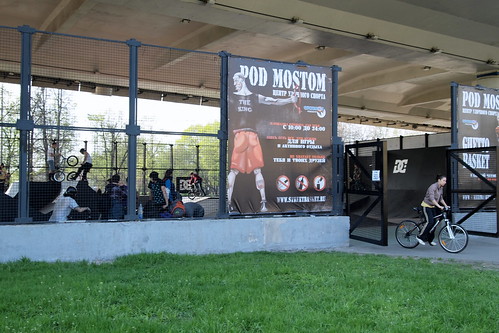
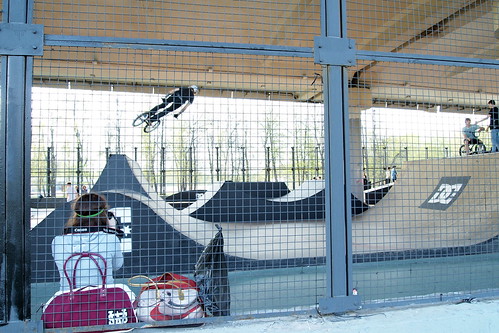




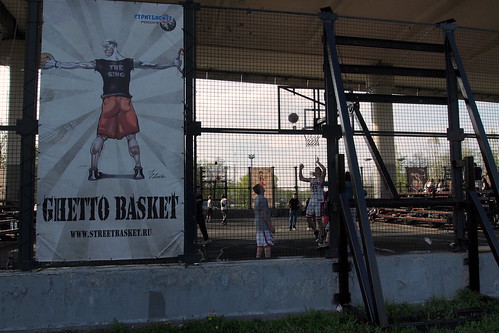
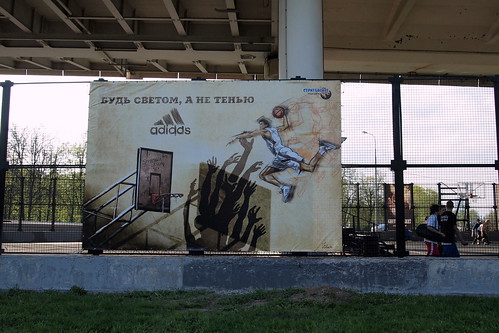

Here's another picture taken on that bridge:

And here's some of what's going on underneath the bridge - pretty awesome and, in the case of all those teens flying up and down on their bikes and skateboards, absolutely breathtaking:









Sunday, May 08, 2011
(UPDATE: This post doesn't make as much sense now as it did initially, because I - haha! - mistook Chinese for Japanese in the text written on the bridge railing! Thank you, Little Miss Moi, for your great explanation! I did have some doubts of my own at one point, but was too sleepy to give them serious thought... :) I would have posted these pictures anyway, even if I had known it was Chinese, not Japanese - and I'm still very curious about what it says there, and I hope it's not something too inappropriate! Sorry if it is!)
A month or so ago, I bought myself a bunch of Japanese textbooks and iPhone apps, and started learning hiragana. Sort of suddenly. I now feel like a kid learning to write, once again. Last time it happened to me was in 1996-98, when I was learning to write in Arabic and Armenian. And it's making me extremely happy.
We're also watching Hayao Miyazaki's wonderful, amazing films all the time. Again, total happiness. Mixed with sadness.
And every now and then, I keep running into traces of Japanese in real life here in Moscow.
On the door of the elevator in our building, for example, someone had scribbled Neko Nyan ^_^. At first, my eyes caught the word "neko" ("cat"), one of the few Japanese words that I know, and I thought that I was, well, seeing things, but then I noticed those cat ears, so Marta and I googled it at home and learned about Chocotto Sister anime and its ending theme, the Neko-Nyan Dance:
Today, a Facebook friend shared a video about this charmingly silly device, Nekomimi (Cat Ears):
Also today, as we were crossing the bridge over the Moscow River at Vorobyovy Gory, I saw this text written on the railing - and now I'm so curious about its meaning. Someone, please help!!! (And, in case it says something nasty and inappropriate, I do apologize to those who knowJapanese Chinese.)
#1

(A comment in Russian by someone who's most likely as clueless as I am: "Completely agree.")
#2
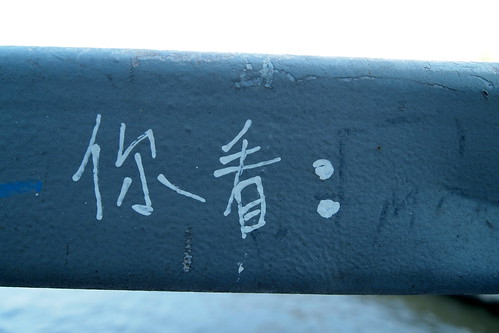
#3
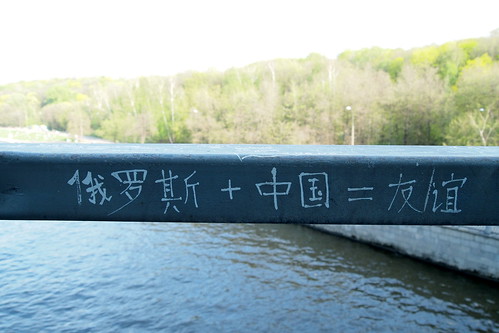
#4

#5.1

("What is it?" - in Russian, in addition to "WTF?")
#5.2

(And they also think it's in Chinese: "A Chinese Corner.")
(Ha, and suddenly I'm having doubts as well - what if it is, indeed, Chinese, not Japanese??? Ouch.)
#6
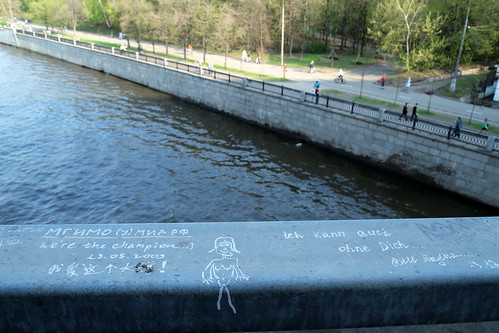
("We're the champions..." - from MGIMO students; something in Japanese; and a German quote from Bill Kaulitz/Tokio Hotel fans.)
There was much more on that railing, including "I love you" in the Tatar language, but since I'm interested in Japanese now, I only took pictures of the stuff above.
Again, I'd love to know the translation! (I hope it's something as innocent and silly as those cat ears, and not some evil curses.)
:)
A month or so ago, I bought myself a bunch of Japanese textbooks and iPhone apps, and started learning hiragana. Sort of suddenly. I now feel like a kid learning to write, once again. Last time it happened to me was in 1996-98, when I was learning to write in Arabic and Armenian. And it's making me extremely happy.
We're also watching Hayao Miyazaki's wonderful, amazing films all the time. Again, total happiness. Mixed with sadness.
And every now and then, I keep running into traces of Japanese in real life here in Moscow.
On the door of the elevator in our building, for example, someone had scribbled Neko Nyan ^_^. At first, my eyes caught the word "neko" ("cat"), one of the few Japanese words that I know, and I thought that I was, well, seeing things, but then I noticed those cat ears, so Marta and I googled it at home and learned about Chocotto Sister anime and its ending theme, the Neko-Nyan Dance:
Today, a Facebook friend shared a video about this charmingly silly device, Nekomimi (Cat Ears):
Also today, as we were crossing the bridge over the Moscow River at Vorobyovy Gory, I saw this text written on the railing - and now I'm so curious about its meaning. Someone, please help!!! (And, in case it says something nasty and inappropriate, I do apologize to those who know
#1

(A comment in Russian by someone who's most likely as clueless as I am: "Completely agree.")
#2

#3

#4

#5.1

("What is it?" - in Russian, in addition to "WTF?")
#5.2

(And they also think it's in Chinese: "A Chinese Corner.")
(Ha, and suddenly I'm having doubts as well - what if it is, indeed, Chinese, not Japanese??? Ouch.)
#6

("We're the champions..." - from MGIMO students; something in Japanese; and a German quote from Bill Kaulitz/Tokio Hotel fans.)
There was much more on that railing, including "I love you" in the Tatar language, but since I'm interested in Japanese now, I only took pictures of the stuff above.
Again, I'd love to know the translation! (I hope it's something as innocent and silly as those cat ears, and not some evil curses.)
:)
Saturday, May 07, 2011
Thursday, May 05, 2011
Marta and I stood watching these ballerina girls rehearse something by the river today (click to enlarge):
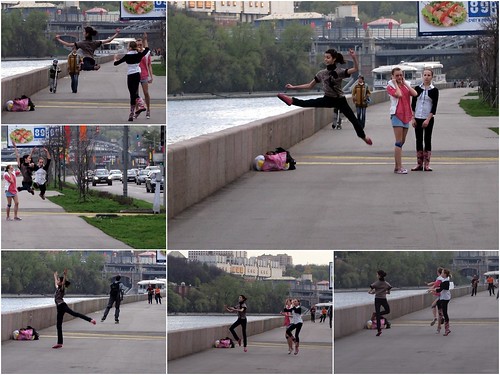
(The Moscow State Academy of Choreography is a couple of blocks away.)

(The Moscow State Academy of Choreography is a couple of blocks away.)
Subscribe to:
Comments (Atom)
